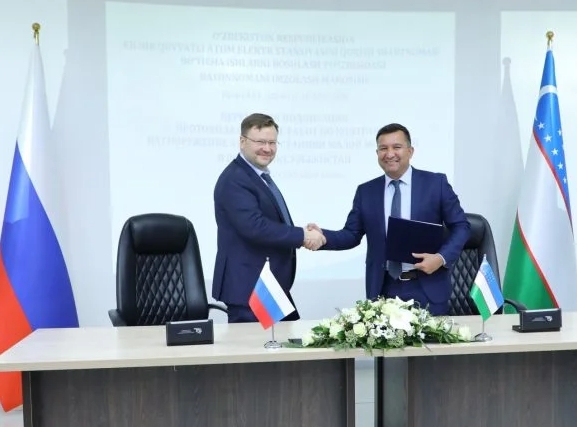
The Directorate for the Construction of a Nuclear Power Plant under Uzbekistan’s Atomic Energy Agency, Uzatom, has signed a protocol with Atomstroyexport (Rosatom’s Engineering Division) on the start of work on the design of a low-power NPP in Uzbekistan. This marks the start of the active phase of preparatory work at the construction site, the development of design and licensing documentation. The protocol was signed in the presence of Uzatom Director Azim Akhmedkhajayev and the Deputy General Director and Director of the International Affairs at Rosatom, Nikolai Spassky.
The initial contract, signed in May during the visit to Uzbekistan of Russian President Vladimir Putin, is for the construction of a 330 MWe low powered NPP (ASMM – Atomnoi Stantsii Maloi Moshnosti) in the Jizzakh region of Uzbekistan. It will comprise six units with RITM-200N water-cooled reactors based on nuclear powered icebreaker technology. The 55 MWe (190 MWt) reactors have a service life of 60 years. The first unit is scheduled to begin operation in late 2029 with the other units commissioned consecutively. Atomstroyexport is the general contractor for the construction of the station and local companies will also be involved in the construction.
The protocol “marks a transition to active work on the implementation of the first ASMM in Uzbekistan and will allow us to begin direct work at the construction site in the near future”, said Otabek Amanov, head of Uzatom’s Directorate for the Construction of a Nuclear Power Plant.

Visualisation of the low-power nuclear plant
“The protocol … enshrines the fact that the priority conditions are met in terms of the regulatory and financial obligations of the parties, said Rosatom’s Pavel Bezrukov, Director of Construction in Central Asia. “The Rosatom Engineering Division is starting to actively develop documentation for obtaining a site licence for the ASMM and for survey work at the construction site.”
Preliminary work on the ASMM project began in the summer in June at the site of the future NPP and priority tasks were identified to allow the start of work according to the schedule. At the end of August, work began on the establishment of a camp for the construction workers.
Uzatom Director Akhmedkhadjaev said that, according to forecasts, demand for energy resources in Uzbekistan will almost double by 2050. “It is evident that for the stable operation of the energy system and economic development, our country must ensure a baseload power source in addition to renewable energy sources. We are witnessing a global increase in interest in new nuclear projects, both in large-capacity power plants and small modular reactors.”